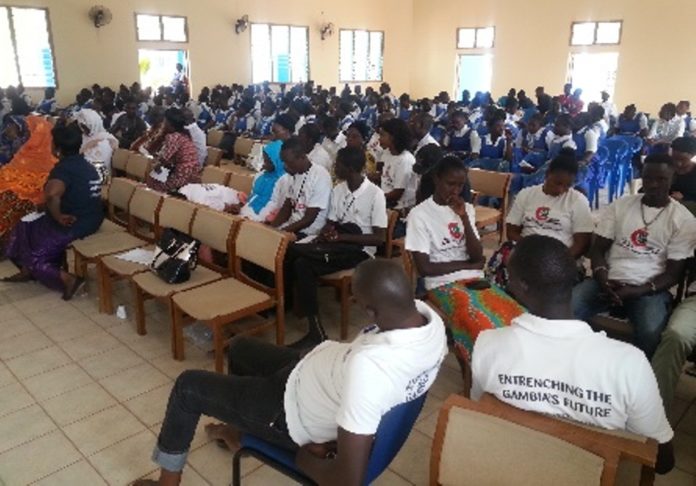By Nelson Manneh
Ndey Fatou Leigh, a grade twelve student at St-Joseph’s Senior Secondary School in Banjul, on Saturday January 26th 2019, told Commissioners of the Constitutional Review Commission (CRC), that not all prisoners who are jailed, are criminals.
Ndey Fatou and many other students, teachers and residents of Banjul, made these and other contributions during the final day of the CRC’s nationwide consultation meeting at the St-Joseph’s Senior Secondary School hall.
“The prison should be a place where people are corrected and trained to become responsible. I believe that they should have the right to vote like any other citizen as far as they are Gambians,” Leigh said.
The nationwide consultation process which started on the 5th of November 2018, saw Commissioners and staff of the CRC as well as journalists, tour the whole country meeting with the people in all the various constituencies and districts, starting from the North Bank of the Gambia.
Justice Cherno Sulayman Jallow, the Chairperson of the CRC, as usual reminded the gathering of the importance of the constitution and why they should be involved in the drafting of the proposed new Constitution.
“As students, you should know that the Constitution belongs to you, and our aim is to draft a Constitution that will serve us for many years and will not be tampered with anyhow by anybody,” he said. Jallow told the gathering that a Constitution is what governs a nation; that in drafting such a document that will govern them, the people should not be left out. He said there are many contributions and suggestions made by the people in other areas, adding if they did not meet them, they would not have captured such important ideas for inclusion in the process.
“The process is not a political process. Therefore, all should participate base on the Gambia as their nation and all contributions are welcome,’’ he said. He took the gathering through the 1997 Constitution on what it says about citizenship and human rights and asked them their opinions.
John Mendy, one of the teachers in the School said the 15 and 7 years mentioned in the 1997 Constitution on naturalization and citizenship by marriage, should be reduced. He said the new Constitution should capture people whose parents are from other countries and they are born in the Gambia. “If those people are not regarded as Gambians, which country do ‘we’ expect them to belong to?” he questioned. He added that he always hears people talking of class under citizenship. He said there is no country that practices such in reality, pointing out that if one is regarded as a particular class of citizen, this can bring segregation.
Fatou Cham another student of St-Joseph’s in her contribution, told Commissioners that diaspora Gambians should be given the right to vote, but not to contest in elections. “We need a president who is educated and will be able to analyse things the way they should be,” she noted; that Regional Governors should not be elected but should be appointed by the president to represent him or her (the president) in the various regions of the country.
Pa Malick Njie a former Civil Savant contributed that for the country to move forward, there should be a Commission for corruption. “The Commissioners should look at ways in which they can help fight corruption, by inserting a provision in the proposed new Constitution to provide for a Commission on Corruption,” he said.
Njie said to write the Constitution is one part of the process, and to implement it another; adding that there should be a body that will ensure that the Laws within the Constitution are implemented to the letter.


















